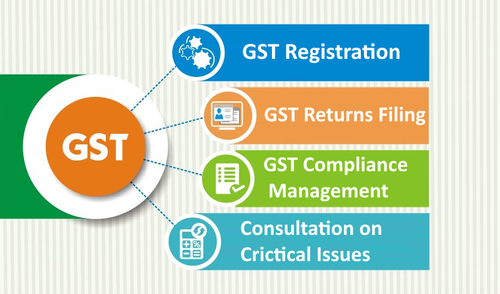Step-by-Step Refine for Singapore GST Registration Explained
Step-by-Step Refine for Singapore GST Registration Explained
Blog Article
The Ultimate Overview to Streamlining the GST Registration Process and Requirements for Local Business Owners

Recognizing GST Essentials
To comprehend the principles of the Goods and Solutions Tax Obligation (GST) system, small company proprietors have to initially recognize its underlying implications and concepts. GST is a value-added tax obligation imposed on most goods and services for domestic intake. It aims to enhance the taxation procedure by replacing numerous indirect taxes enforced by the state and central governments. Under the GST regime, services are needed to sign up and gather tax on behalf of the government, making sure openness and conformity.
Among the crucial principles of GST is input tax credit history, which allows companies to assert credit scores for taxes paid on their purchases. This device prevents the plunging impact of tax obligations and advertises effectiveness in the tax obligation system. Furthermore, GST is a destination-based tax obligation, meaning that the tax obligation is imposed at the point of usage instead of the point of beginning. This ensures fair circulation of tax profits amongst states based on where the services or goods are eaten. Understanding these fundamental principles is critical for little organization owners to navigate the intricacies of the GST system and ensure compliance with the legislation.
Qualification Requirements for Registration
Having actually developed a foundational understanding of GST concepts, small company proprietors must currently fulfill specific eligibility standards to proceed with the enrollment procedure. In India, entities engaged in the supply of items or solutions with an annual accumulation turnover going beyond Rs. 40 lakhs (Rs. 10 lakhs for unique category states) are called for to register for GST. In addition, particular organizations such as those associated with inter-state supply of items, informal taxed individuals, and those called for to pay tax obligation under the reverse cost system need to sign up for GST regardless of their turnover. Organizations that were registered under the previous tax regimen (BARREL, solution tax, etc) are also mandated to register under GST. Agricultural organizations that only provide create out of primary manufacturing are exempt from GST enrollment. It is critical for local business owner to thoroughly analyze their qualification based on these requirements to guarantee conformity with the legislation and avoid any kind of charges for non-compliance.
Records Needed for GST Enrollment

Simplified Registration Process Steps
Following the collection and verification of the requisite records, the registration procedure for GST can be browsed via a collection of streamlined actions designed to assist in efficient compliance for small company owners. Upon effective confirmation, an Application Reference Number (ARN) is provided, suggesting the conclusion of the GST registration process. By complying with these simplified steps, little organization proprietors can properly sign up for GST and ensure compliance with tax obligation policies.
Tips for Ensuring Conformity
To keep governing adherence check my blog and functional integrity, diligent oversight and aggressive actions are crucial in making certain compliance with GST demands for small organization proprietors. Little organization owners should stay updated with GST policies, submitting due dates, and any type of changes in tax rates to prevent charges and maintain an excellent standing with tax obligation authorities. One crucial tip for conformity is to maintain exact and in-depth records of all transactions, including expenditures, receipts, and billings associated to GST. Consistently reconciling financial documents with GST returns can aid in recognizing and fixing any type of inconsistencies quickly. In addition, performing regular interior audits or seeking expert aid can make sure that the service is complying with all GST policies correctly. It is additionally essential for tiny organization proprietors to purchase GST-compliant audit software that can enhance the tax obligation filing procedure and reduce errors. Participating in GST recognition workshops or training programs can enhance understanding and conformity with GST policies, ultimately profiting the organization in the lengthy run.
Final Thought
To conclude, small company owners should recognize the basics of GST, satisfy the eligibility standards, collect necessary papers, and adhere to the simplified enrollment procedure actions to guarantee conformity. By simplifying the GST registration procedure and needs, local business proprietors can prevent fines and operate their services efficiently within the lawful structure - Singapore GST Registration. It is important for local business owners to remain enlightened and compliant with GST guidelines to preserve an effective organization operation
Little service proprietors looking for GST enrollment must guarantee they collect and submit the required documents to complete the registration process efficiently. The papers required for GST enrollment normally include proof of organization enrollment or unification, PAN (Long-term Account Number) card of the service address, entity and identity proof of the promoters/partners/directors, photographs, address evidence of the area of organization, financial institution account statements or canceled cheques, and consent forms. Attending GST recognition workshops or training programs can enhance understanding and compliance with GST guidelines, inevitably benefiting the company in the lengthy run.
By streamlining the GST original site enrollment procedure and demands, small service owners can avoid fines and operate their services smoothly within the legal structure. It is critical for tiny organization owners to remain compliant and enlightened with GST laws to maintain an effective business operation.
Report this page